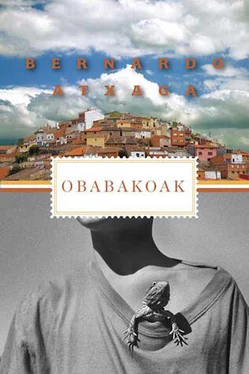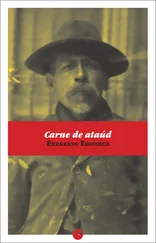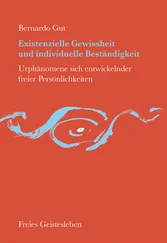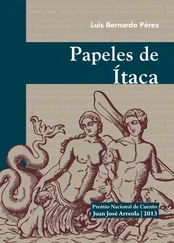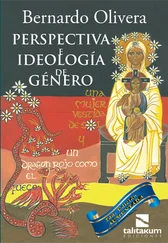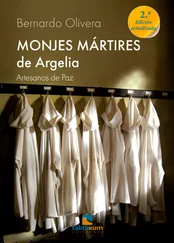Bernardo Atxaga - Obabakoak
Здесь есть возможность читать онлайн «Bernardo Atxaga - Obabakoak» весь текст электронной книги совершенно бесплатно (целиком полную версию без сокращений). В некоторых случаях можно слушать аудио, скачать через торрент в формате fb2 и присутствует краткое содержание. Год выпуска: 2010, Издательство: Graywolf Press, Жанр: Современная проза, на английском языке. Описание произведения, (предисловие) а так же отзывы посетителей доступны на портале библиотеки ЛибКат.
- Название:Obabakoak
- Автор:
- Издательство:Graywolf Press
- Жанр:
- Год:2010
- ISBN:нет данных
- Рейтинг книги:3 / 5. Голосов: 1
-
Избранное:Добавить в избранное
- Отзывы:
-
Ваша оценка:
- 60
- 1
- 2
- 3
- 4
- 5
Obabakoak: краткое содержание, описание и аннотация
Предлагаем к чтению аннотацию, описание, краткое содержание или предисловие (зависит от того, что написал сам автор книги «Obabakoak»). Если вы не нашли необходимую информацию о книге — напишите в комментариях, мы постараемся отыскать её.
Obabakoak
The Observer
Obabakoak — читать онлайн бесплатно полную книгу (весь текст) целиком
Ниже представлен текст книги, разбитый по страницам. Система сохранения места последней прочитанной страницы, позволяет с удобством читать онлайн бесплатно книгу «Obabakoak», без необходимости каждый раз заново искать на чём Вы остановились. Поставьте закладку, и сможете в любой момент перейти на страницу, на которой закончили чтение.
Интервал:
Закладка:
“Everything in Martín’s head has been wiped clean, as if it were a tape. The worst thing is that he can’t record anything new on it either,” he explained as we drank our coffee.
“But there’s a chance he’ll recover.” Martín’s mother had told me that there was.
“I don’t think so,” he said, and that struck me as an opportune moment to change the subject.
“When I was a child I met another man whose mind was unhinged. But he went mad because he remembered too much,” I began. And I told him about what had happened at my aunt and uncle’s house.
“I think of the memory as being rather like a dam,” he said, after a pause for thought. “It irrigates and gives life to our whole spirit. But, like a dam, it needs overflow channels if it’s not to burst its banks. Because if it ever does overflow or burst, its waters will destroy everything in their path.”
“And, on the other hand, once it’s emptied out, it will dry up forever,” I added. He nodded, a little wearily. “I find it hard to believe that anyone could descend into such a hell,” I said, mainly to ease my own fears. And I told him what my own experience had been. I even said that, for me, the past consisted of only a few images. That when I looked back I found no guiding thread, no neatly constructed landscape, but a void scattered with islands, with memories. A sea of nothingness broken up by a few islands, that was how I pictured my past.
What I said clearly struck the director as odd. He smiled wanly and patted me on the back.
“You’re right, of course, but memory can be a tricky thing. Memory, how can I put it?… Memory, like the heart, is a bit antiquated. It pays little heed to logic.”
“So how much should you remember?” I asked, half joking, as I got up from my armchair to indicate that it was time for me to go.
“Neither too much nor too little.”
“But how many words, say?”
“Nine,” he said, laughing, and I didn’t ask him to explain further because I thought it must be some kind of private joke and that the number had some special significance for him.
We said good-bye at the door of the summerhouse. He went back to the house and I to the Chinese arch.
And that brings to an end both the second story and the introduction with which I wanted to preface my memories of the village of Villamediana, an introduction that, illustrating as it does two examples of faulty memory, should act as a lucky charm and ensure a successful end to my work. However, even with that protection, I feel afraid, I fear the dangerous places through which I will inevitably have to pass. I will, therefore, follow the advice given me by the hospital director. I will speak of Villamediana, but neither too much nor too little. Nine words will suffice for me to sum up my long stay there.
1. Looking back on my life, I come across an island by the name of Villamediana. If I were asked to choose five words from the dictionary and use them to form a kind of instant description of the village or to give some sense of what it was like, I would have to choose, first and foremost, the word sun. For I saw it almost every day: streaming in through the cracks in the shutters when I woke, fixed like a golden nail in the center of the blue sky when I went out into the street, and setting the brushwood aflame and painting the adobe walls bloodred as evening fell. The second word I’d choose would be wheat field and then I’d have to describe its colors, first green and then yellow, a yellow that, in summer, extended from the very edge of the village as far as the eye could see and beyond. The last three words would have to be empty, crow, and sheep, for most of the houses in Villamediana were empty and crows and sheep were frequently the only creatures enlivening the landscape.
While those five words would, on the one hand, be enough to give an impression of that island I call Villamediana, even perhaps of the whole of Castile, on the other hand, such a description is no more adequate than a simple schoolboy composition or the visions of poets who, judging by what one sees and reads, only go there for their holidays. Many details of my experiences there would of necessity be omitted, for example, what happened on my arrival in the village. For I arrived in Villamediana, not when the village was awash with sun and girdled by wheat fields, but on a dark winter’s day.
2. Some people proudly claim that their mood doesn’t depend on what kind of day it is outside. My happiness, they say, doesn’t depend on the color of the sky, I have my own inner climatology.
Unfortunately, I can make no such proud boast. If it’s true that we retain within us the memory of all existence and that a vestige of primeval time lives on in our cells, then I’m convinced that the ferns and mosses of the beginnings of life wield a powerful influence over my changes in mood. My spirit is essentially the same as that of plants: It revives with the good weather and is cast down by the rain or the cold. A pleasant enough dependency, of course, when I find myself in sunny climes, but most unpleasant if the forces of winter militate against me, as happened on my first encounter with Villamediana.
For, as I said, I arrived in Villamediana on a dark winter’s day. By noon the mist had closed in completely and when, after sorting out my things, I went to look out of the window, the village appeared to me as if wrapped, rather ineptly, in a length of ice-cold, off-white linen that left only fragments of landscape uncovered: a rooftop here, the bare crown of an elm there, the rounded bell tower of the church near the center. They were dim shadows, chilly ghosts hanging in the air, more intimidating than the mist itself.
It was a disappointing landscape for someone, like myself, who has allowed himself to be seduced by the sort of mirage that always accompanies a change of address. Before undertaking the journey I was convinced that the simple fact of arriving at this new place would mean that I could jettison a whole section of my past life like so much ballast; henceforward everything would be easy, luminous, different. When I imagined myself living there, the only thing I had difficulty in picturing with any exactitude was the landscape: how many roads there would be, how many houses, what those houses would be like, and if the bleak plateaus really would look like squat trapezoids. But, as regards the sky, I had no doubts. For in the sky, as if daubed there by a naive painter, I always placed the sun, the symbol of my new life. It would be a weak sun, as befitted winter, but strong enough nonetheless to cheer even a spirit such as mine, overgrown with ferns and mosses. But there was no sun, no light. I was greeted instead by that dank, rather grubby mist.
My first walks around the village did nothing to improve that first impression. There wasn’t a soul to talk to in the eternally empty streets and the silence that wrapped about them forced me back in time to confront again one of the nightmares of my infancy, that of being an abandoned child in a dead city. The only sound to be heard was that of the drips the mist formed along the gutters beneath the rooftops as it condensed; for the drips became threads of water and the threads became streams that fell at last onto the cement surface of the pavements producing an echo of applause that reverberated faintly out toward the church, the main road, and the plateaus. But that was all. No other sign of life penetrated the mist.
After only a couple of days in Villamediana, the mirage that had led me there started to fade. The old world, the one I had so longed to leave behind, began to seem attractive to me again. To my surprise I found myself lying in bed and missing the cinemas, the cafés, the noise. But I had to put up with it. For various reasons, my immediate return to the city was impossible. Furthermore I knew, from the agency that had rented me the house, that the village had two hundred inhabitants. Sooner or later, they would appear and I would meet them and speak with them.
Читать дальшеИнтервал:
Закладка:
Похожие книги на «Obabakoak»
Представляем Вашему вниманию похожие книги на «Obabakoak» списком для выбора. Мы отобрали схожую по названию и смыслу литературу в надежде предоставить читателям больше вариантов отыскать новые, интересные, ещё непрочитанные произведения.
Обсуждение, отзывы о книге «Obabakoak» и просто собственные мнения читателей. Оставьте ваши комментарии, напишите, что Вы думаете о произведении, его смысле или главных героях. Укажите что конкретно понравилось, а что нет, и почему Вы так считаете.
